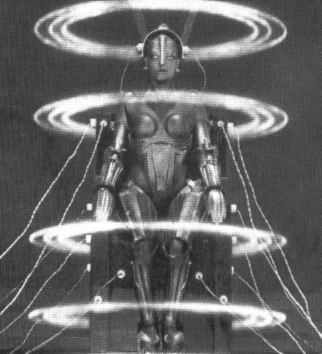
I just got in from a showing at the AFI of Stuart Gordon's RE-ANIMATOR. I have to say...a quarter of a century later, it still packs a whallop.
Loosely, very loosely based on a short story by H. P. Lovecraft, it chronicles the adventures of Herbert West (Jeffrey Combs, in a star-making performance), mad scientist extraordinaire, as he experiments with a new "reagent" that reanimates the dead. He ropes in med student Dan Cain (Bruce Abbott), who's dating the dean's nubile daughter (Barbara Crampton, who was quite a sport for enduring this movie), and also has to deal with the hostile dean (Robert Sampson) and deranged brain specialist Dr. Hill (David Gale). And the result is gore galore.
When I first saw it (rented in the 80s from my small-town video store; I never saw it on the big screen until tonight), I was first a bit shocked by how it turned a Lovecraft work into a comedy. But then...I had to admit...it worked, like gangbusters. As a more mature horror fan, I read Lovecraft and see how easy it is to turn it into comedy; Lovecraft's over-the-top phrenzy is easy to parody. Combs' West is a great interpretation of the mad scientist; it's just restrained enough to make the character believable and somewhat sympathetic. West is obviously the smartest man in the room, and he knows it. He's unconcerned with emotion and ethics; everything is done to further his research, and while sometimes the things he does are shocking, they make sense from his viewpoint. The late David Gale had a ball, hamming it up as Dr. Hill; he later said in interviews that he thoroughly enjoyed the role and took an active part in developing Dr. Hill's personality.
What the flick is famous for is the cheerful over-the-top gore, in amounts that films today rarely touch. Not to mention one of filmdom's most gruesome sight gags, when Meg is strapped to the table and Dr. Hill is paying her some attention.
But what stands out for me now is the homoerotic subtext. West's recruitment of the hunky Cain as an assistant seems as much motivated by Cain's looks as his qualifications as a medical student. (We're never led to believe he's anything more than an average student.) The static existing between West and Meg is natural for rivals, and she's furious when she catches them together...well, in an experiment, but still. West and Cain's first human experiment is a tall naked hunk (played by Peter Kent, Arnold Schwarzenegger's stunt double). And when Cain goes into shock after an experiment goes awry, West's solicitous treatment is about as loving as he can get.
I've only seen the sequel, BRIDE OF RE-ANIMATOR, once, but I recall it carrying the subtext, with West doing what he could to hold on to Cain, even creating him a woman if it meant that Cain would hang around. ("Look, OK, I'll let you have a woman on the side, just stay with me! I need you!")
All that aside, it's stood up well. There was a second sequel, BEYOND RE-ANIMATOR, that I've never seen, and a fourth film, HOUSE OF RE-ANIMATOR, has been languishing in Development Hell for years (and the buzz is that it will never happen, but some still hold out hope). It's hardly totally loyal to Lovecraft (although a wonderfully funny and macabre scene, where a reanimated headless body sneaks into a morgue with a fake head strapped on, is lifted more-or-less directly from Lovecraft), but it's a breath of fresh air in an age when horror films tend to focus on killing as many teenagers as possible. It's flawed, sure (Meg is underwritten and an annoying character, and the technical crudeness shines through from time to time) but the nostalgia helps make up for any missteps.
Hardly a film for horror beginners, and not for those with weak stomachs, it's still a worthy rental (or even a purchase) for longtime fans.








